I was a teenager when writer/director Spike Lee’s, Do the Right Thing (1989) hit theaters. I was a lot more naïve and free-thinking back then than I am now. For me, there was no question that racism existed and that many African Americans had a reason to be “angry”. Now, as I have aged and experienced the world, I still think African Americans still have reasons to be “angry”, but not for the same reasons that I thought back in 1989. When I watch Do the Right Thing now I get a little aggravated at the mixed message that Lee delivers. There’s no doubt that this is a powerful film, but now nearing the age of 25, its message has not aged well.
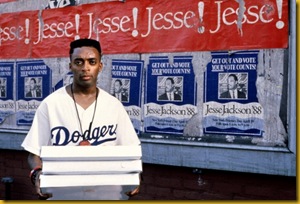 The story takes place in Bedford-Stuyvesant in Brooklyn on one exceedingly hot summer day. Mookie (Lee himself) is a pizza delivery man for Sal’s Pizzeria. He lives with his sister (Lee’s real-life sister Joie Lee), but has a girlfriend (Rosie Perez) and baby whom he doesn’t really support. He has an odd relationship with Sal (Danny Aiello) and his two sons, Pino (John Turturro) and Vito (Richard Edson). Pino despises African Americans, while Sal and Vito are more friendly toward the African Americans who frequent the pizzeria. The neighborhood is full of caricatures—a drunk old man (Ossie Davis), a window-watching elderly stateswoman (Ruby Dee), a boom-box toting giant (Bill Nunn), a stuttering mentally challenged young man (Roger Guenveur Smith), a Black Power agitator aptly named Buggin’ Out (Giancarlo Esposito), and three chair holder downs (Robin Harris, Frankie Faison, and Paul Benjamin).
The story takes place in Bedford-Stuyvesant in Brooklyn on one exceedingly hot summer day. Mookie (Lee himself) is a pizza delivery man for Sal’s Pizzeria. He lives with his sister (Lee’s real-life sister Joie Lee), but has a girlfriend (Rosie Perez) and baby whom he doesn’t really support. He has an odd relationship with Sal (Danny Aiello) and his two sons, Pino (John Turturro) and Vito (Richard Edson). Pino despises African Americans, while Sal and Vito are more friendly toward the African Americans who frequent the pizzeria. The neighborhood is full of caricatures—a drunk old man (Ossie Davis), a window-watching elderly stateswoman (Ruby Dee), a boom-box toting giant (Bill Nunn), a stuttering mentally challenged young man (Roger Guenveur Smith), a Black Power agitator aptly named Buggin’ Out (Giancarlo Esposito), and three chair holder downs (Robin Harris, Frankie Faison, and Paul Benjamin).
The film is a study in how African Americans, Hispanics, Koreans, and whites get along with one another in this racially diverse borough. Stereotypes abound, and at one point in the film Lee has a member of each race spew as many racially charged descriptions about another race as they can think of. In this, at least, there is a very balanced take on how some races view their counterparts. Yet, after this, I find the film unbalanced in its analysis of race.
The film hinges on Sal’s right to hang pictures of Italian Americans on his restaurant’s wall and to refuse to allow Radio Raheem (Nunn) to play his boom-box in his restaurant. There are many arguments on both sides, but the fact remains that if you respect all people’s rights and not only what you perceive to be yours, then you know that if someone owns a business they can run it however 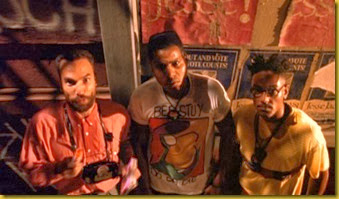 they want—it is your right not to patronize it if you don’t agree with the owner. For me, that is doing the right thing. So, when Sal busts Raheem’s boom-box with a bat and Raheem proceeds to attempt to choke Sal to death for it while only his sons appear to be trying to help Sal, I wasn’t offended when the police tried to restrain Raheem. Did they go too far when they choked him to death? Yes—but whose to say that Raheem wouldn’t have done the same thing to Sal if the police hadn’t come? This is one very important sticking point that is NEVER mentioned in discussion of this film.
they want—it is your right not to patronize it if you don’t agree with the owner. For me, that is doing the right thing. So, when Sal busts Raheem’s boom-box with a bat and Raheem proceeds to attempt to choke Sal to death for it while only his sons appear to be trying to help Sal, I wasn’t offended when the police tried to restrain Raheem. Did they go too far when they choked him to death? Yes—but whose to say that Raheem wouldn’t have done the same thing to Sal if the police hadn’t come? This is one very important sticking point that is NEVER mentioned in discussion of this film.
But the thing that aggravates me the most about Do the Right Thing is when Mookie throws a trash can through Sal’s window and the entire neighborhood proceeds to destroy and loot it—and then one idiot burns it down. In 2001, we had a week-long study in stupidity when African Americans rioted when a black teenager was fatally shot by the police. Businesses were looted (mostly ones frequented by African Americans) and many African American entertainers cancelled bookings in the city in protest. As a result, an even more antagonistic relationship devel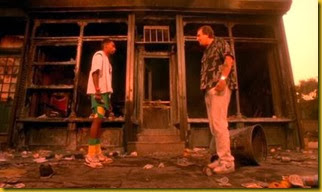 oped between the African American community and the police—so much so that the police responded exceedingly slow whenever they were called to an emergency. In the three months after the riots, 77 people were shot in Cincinnati—76 of those were African Americans. For me, destroying your community to make a point is NOT doing the right thing.
oped between the African American community and the police—so much so that the police responded exceedingly slow whenever they were called to an emergency. In the three months after the riots, 77 people were shot in Cincinnati—76 of those were African Americans. For me, destroying your community to make a point is NOT doing the right thing.
As such, when I watch Do the Right Thing I get frustrated that Spike Lee does not clearly make this point. Running two quotes at the end of your film, one by Dr. Martin Luther King, Jr., and one by Malcolm X, that contradict one another about whether it is right to use violence to achieve and maintain your rights, is a cop-out. Also, the audacity the Mookie shows to “get paid” the day after the riot is just ridiculous. You throw a trash can through your boss’s window and incite a disturbance that unquestioningly destroyed said business that employees you, and you still want to get paid? My God, are you trying to bolster the racial stereotype of African Americans with their hands out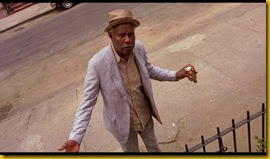 asking for money when they don’t deserve it?
asking for money when they don’t deserve it?
As for the overall production value of Do the Right Thing, Lee was smart to frame his story within a 24-hour period. This allows for no real meandering and keeps the plot moving steadily. He was also smart with his casting decisions, as he mostly chose actors who fit their characters perfectly. Ossie Davis as the philosophical borough drunk was interesting to watch, as well as Robin Harris, Frankie Faison, and Paul Benjamin as the would-be Greek chorus of the story. Hands down, however, the most riveting performances come from Aiello and Turturro. Aiello earned an a Best Supporting Actor nomination for his  conflicted portrayal of a man who wants to continue on in a neighborhood that has dramatically shifted in racial dynamics over the years. And, Turturro is phenomenal (as usual), as a pathologically racist who is surrounded by the races that he loathes so much.
conflicted portrayal of a man who wants to continue on in a neighborhood that has dramatically shifted in racial dynamics over the years. And, Turturro is phenomenal (as usual), as a pathologically racist who is surrounded by the races that he loathes so much.
Overall, Do the Right Thing is a polarizing film. There are some who find it right on point and thought-provoking regarding the race discussion in America. For me, however, I think the movie is ambiguous and doesn’t make a clear statement on race. The story is powerful, but its ending is troubling and delivers a contradictory message.

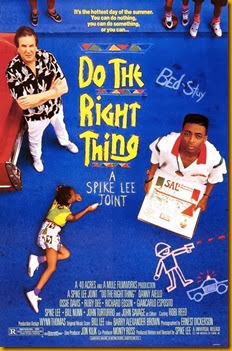
For me the biggest weakness with this film is that Lee cast himself in the key role of the person who sets off the riot. He had been in his own films before, so being in this one was not a surprise. I felt that he just didn't have the acting chops to carry off the part. Maybe he didn't want to ask anyone else in his cast to play what might be a lightning rod of controversy or maybe he felt it was the most important part and wanted it for himself. Either way, I felt it hurt the impact of the film.
ReplyDeleteThat's a weakness, too. He has never been a particularly strong actor--I expect that's why he doesn't appear in many of his own films anymore.
DeleteVery effective movie, all because Lee has an agenda, but he never allows us to see what it is or what side he is on the most. It's something he would continue to do for the rest of his career, but was done to perfection with this utter classic. Good review Kim.
ReplyDeleteThanks, Dan. I do find it a bit disconcerting, though, that it appears obvious that he has an agenda, but the viewer is never really clear on what that agenda is.
DeleteBrace yourself. I know it’s just an honor to be nominated, but….are you sitting? YOU’RE BEING GIVEN THE SUNSHINE AWARD!!! Seriously though, you’re doing some great work on this blog, so take a break, have a little fun and bask in the glory of your awesomeness!
ReplyDeletehttp://1001movieman.blogspot.com/2013/11/the-sunshine-award.html
I saw a guy on Jeopardy a few days back who said he'd watched every movie in the 1001 list, and came across this phenomenal blog while searching for said list. Kudos to your great work on preliminary examination of the site.
ReplyDeleteAs for your great analysis of Do the Right Thing: I think the trashcan through the window was Mookie actually SAVING Sal. The crowd was full of pent-up emotion, and it was going to be unleashed on someone or something that night. Mookie turned their anger away from Sal and his sons and onto the store itself. Sal himself knows this; his true anger the next day is both at the fact that something he built "with his bare hands" was destroyed as well as the fact that despite being a respected part of the community for so long that very community the night before had turned on him. Ironically enough, the Korean people (who had been much more antagonistic to the black residents than Sal had throughout the movie) survive the crowd's bloodlust by somehow convincing them that they are "one of them".
And I also have to disagree with your critique of the two trailing quotes as a cop-out: I think that's one of the movie's stronger moves. In indirectly critiquing the film's climactic moments (the Radio Raheem fight/death and the store burning) he highlighted one of the biggest questions of the civil rights era (non-violence vs armed resistance) as articulated by two of the most famous proponents of each tactic (where each man makes IMHO a measured, rational argument for their side whether you agree or not), Adding their statements also puts a coda on their subliminal presence throughout the movie via the photographs of the mentally challenged man (a character I wholly dislike because his presence/affliction/actions were wholly superfluous to me)
Overall it's a flawed movie - and as a Spike Lee fan i think ALL of his movies are flawed in one way or another (esp. in the analysis/caricature of race) - but like you said the casting and narrow timeline/location hold it together.
Thanks for the nice comments about my blog.
DeleteYou make good points about the events in the film. I also found it interesting that the Koreans were left alone because they convinced the rioters they were one of them, and Sal had been there for decades.
"For me, however, I think the movie is ambiguous and doesn’t make a clear statement on race."
ReplyDeleteI just saw this movie for the first time a few weeks ago and felt like that WAS the statement. you know, as evidence by the two quotes at the end. there is no such thing as one argument which is valid all the time.
It is true that there are two sides to every argument. However, I feel as if Lee doesn't truly make a clear, defined statement about what his argument is--hence, why I find the conclusion irritatingly ambiguous.
Delete